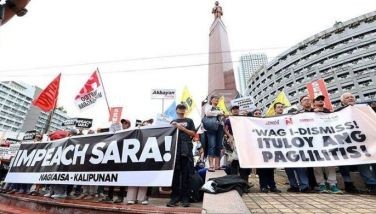The proposed Bangsamoro Basic Law

Cagayan De Oro City Representative Rufus Rodriguez, the chairman of the House Ad Hoc committee for the review of the Bangsamoro Basic Law (BBL) – is the man of the hour. The series of consultative meetings (open public hearings) in Mindanao which started in September should end by December 17 (before Christmas this year). Now the question is: Is there a deal or no deal? Abangan!
When the Bangsamoro Framework Agreement was signed in 2012 both the Philippine government and the Moro Islamic Liberation Front were jubilant. And when finally the Comprehensive Agreement on the Bangsamoro (CAB) was signed on March 27, 2014, all parties concerned saw a ray of hope for peace and progress in Mindanao. Let’s pray that this will certainly resolve the problems over there.
The CAB incorporates agreements between the Philippine Government and the Moro Islamic Liberation Front signed in the past two years: the Framework Agreement on the Bangsamoro (signed December 2012), the Addendum on Bangsamoro Waters (signed in January 2013), and four annexes to FAB—the Annex on Transitional Arrangements and Modalities (signed in February 2013), the Annex on Revenue Generation and Wealth-Sharing (signed in August 2013), the Annex on Power-Sharing (signed in December 2013), and the Annex on Normalization (signed in January 2014). The CAB will be the basis for the crafting of the Bangsamoro Basic Law Bill.
The draft Bangsamoro Basic Law, now House Bill No. 4994, was finally submitted to Congress during ceremonies held in Malacañang Palace on September 10, 2014. Presidential Adviser on the Peace Process Teresita Deles recognized the event as a turning point in the nation’s quest for peace in Mindanao. During the ceremony, President Benigno S. Aquino III asked Congress to “pass this bill in the soonest possible time.”
Recently, this draft Bangsamoro Basic Law has been the subject of scrutiny by various groups and concerned individuals. Dr. Cesar Pobre, a retired colonel of the AFP and presently a consultant/research fellow at the OFP Office of Strategic and Special Studies wrote a position paper on House Bill No. 4994. He recommended the inclusion in the BBL of a provision expressing that the Bangsamoro is a constituent part of the Central Government, that it renounces its original policy of separatism and goal of independence, and that it undertakes to decommission its combat elements with all their arms removed from their possession, and stored under lock and key. He added that all provisions on redeployment should be omitted or repealed because they tend to prevent the Philippines from exercising its sovereign power to preserve and enhance particularly the internal security of the whole country, including the Bangsamoro.
Retired General Renato S. De Villa also made some recommendations for some parts to be changed. On Article II – Bangsamoro Identity, he recommends that there be an emphasis that the Bangsamoro people are Filipino citizens just like any other person who is qualified to be a Filipino citizen pursuant to the provisions of the Constitution. Therefore, the last sentence in Section 1 should be reworded as follows: Spouses and their descendants are classified as Bangsamoro and shall remain as citizens of the Philippines. This is intended to enhance the promotion of national unity and understanding among all regional and cultural communities that comprise the Filipino nation. On Article IV- General Principles and Policies, Section 4 provides that governance in the Bangsamoro is the responsibility of the duly elected civilian government…and that civilian authority is at all times supreme over the military. He recommended that the second sentence should be omitted in the proposed law. The phrase “civilian authority” in regard to the AFP (military) refers to the President of the Philippines only and not to any other official of the government. The president is the Commander-in-Chief of all armed forces of the Philippines and does not share that position with anybody else in government.
De Villa further notes that in the annex on normalization, it is recommended that Normalization as defined in the Annex to the Framework Agreement on the Bangsamoro (FAB) be included as a major provision in the proposed Bangsamoro organic law being crafted by Congress. Specific recommendations are: there should be a timeline and specific calendar dates targeted for accomplishment in the decommissioning of BIAF armed formations and their weapons or armaments. The provision in the said annex (Paragraph C9) that states: “The decommissioning of MILF forces shall be parallel and commensurate to the implementation of all the agreements of the Parties” is too general and the process could take years to accomplish. In the meantime, there will continue to exist in Mindanao an armed MILF participating in the elections and other civilian activities in areas where they are present.
Last week, in a position paper dated November 17 and submitted to the House of Representatives Ad Hoc Committee on the BBL, Ombudsman Conchita Carpio Morales specifically opposed six provisions of the draft measure as contained in House Bill 4994. Two points she stated is quite interesting: in Section 2 (8) Article 5 of the BBL which states that “the Bangsamoro Government shall have primary disciplinary authority over its own officials and employees,” she noted that such provision shall diminish the Ombudsman’s constitutional power to investigate any act or omission of any public official, employee, office or agency as it divests the Ombudsman’s powers to investigate elective and appointive officials of the Bangsamoro government; and in Section 7 Article 9 which provides prosecutorial powers to the Bangsamoro Human Rights Commission (HRC), the counterpart body of the central government’s Commission on Human Rights (CHR), Morales pointed out that under the law, only the CHR have investigative powers over cases of human rights violations. “The Bangsamoro Human Rights Commission (HRC) is given prosecutorial powers which the Commission on Human Rights or CHR of the central government does not possess. In this sense, the Bangsamoro Human Rights Commission would become more powerful than the Commission on Human Rights.”
Justice Secretary Leila de Lima maintained that the establishment of an autonomous justice system under the proposed Bangsamoro Basic Law is in accordance with the Constitution.
The House Ad Hoc committee for the BBL should be very objective and extra careful. They should not rush the approval until all areas have been thoroughly reviewed and revised. This is a new law that almost gives supreme powers to the Bangsamoro.
- Latest
- Trending

























